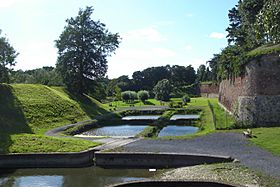Siege of Le Quesnoy (1793) facts for kids
Quick facts for kids Siege of Le Quesnoy (1793) |
|||||||
|---|---|---|---|---|---|---|---|
| Part of War of the First Coalition | |||||||
 The defenses of Le Quesnoy are preserved in a park. |
|||||||
|
|||||||
| Belligerents | |||||||
| Commanders and leaders | |||||||
| Strength | |||||||
| 18,000 | 5,000 | ||||||
| Casualties and losses | |||||||
| 208 | 5,000 | ||||||
The siege of Le Quesnoy was an important event during the War of the First Coalition. It took place from August 28 to September 13, 1793. A large army of Austrians and French Royalists surrounded the town of Le Quesnoy in France. They were led by François Sébastien Charles Joseph de Croix, Count of Clerfayt. Inside the town, a smaller group of French Republican soldiers defended it. Their commander was François Goullus. After about two and a half weeks, the French soldiers had to give up. They had lost many people in the fighting. Le Quesnoy is a town near the border with Belgium. It is about 27 kilometers (17 miles) west of Maubeuge.
What Happened at Le Quesnoy?
After winning two other important sieges at Condé and Valenciennes, the armies fighting against France split up. One part, mainly Austrian soldiers, went to besiege Le Quesnoy. Another part, led by British soldiers, went west to try and capture Dunkirk.
On September 11, two groups of French soldiers tried to help Le Quesnoy. One group came from Cambrai in the west. They were defeated in a battle called the Battle of Avesnes-le-Sec. The other group came from Maubeuge. They were also pushed back and could not reach the town.
The soldiers defending Le Quesnoy had to surrender on September 13. This was a victory for the armies fighting against France. However, the attempt to capture Dunkirk failed completely. After Le Quesnoy, the Austrian army then went on to besiege Maubeuge. This led to another battle called the Battle of Wattignies in October.
Who Fought in the Siege?
The army that surrounded Le Quesnoy was led by the Count of Clerfayt. It had about 18,000 soldiers. Most of these soldiers were from Austria. There were also some French Royalists who were fighting against the new French Republic. The French Royalists had some cavalry, which are soldiers who fight on horseback.
The soldiers defending Le Quesnoy numbered about 5,000. They were French Republican soldiers.
What Were the Results of the Siege?
The armies that won the siege reported that they lost 208 soldiers. These were either killed or wounded. The French soldiers defending Le Quesnoy suffered much heavier losses. About 1,000 of their 5,000 soldiers were killed. The remaining 4,000 French soldiers became prisoners of war. This meant they were captured by the enemy.
 | Precious Adams |
 | Lauren Anderson |
 | Janet Collins |

